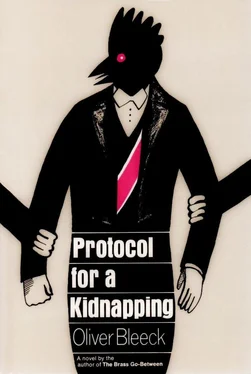A small-time thief, who proudly described himself as Constant Reader, had stolen a goodly amount of jewelry from one of Myron Greene’s clients and then informed the lawyer that he was perfectly willing to sell it all back at nominal cost providing that I served as the go-between. I had done so because it provided material for a couple of fair columns that appeared just before the newspaper folded on Christmas Eve, a date much favored by publishers to suspend operations, possibly because of the attendant poignancy, but more probably because few persons really give a damn about reading a newspaper on Christmas Day.
Just as the last of my severance pay was running out three months later, I again was approached by Myron Greene, this time to serve as the intermediary or payoff man in the kidnapping of the son of a client of a fellow attorney who recalled how I had handled the jewelry thing. So for $10,000 in what Greene, to my dismay, insisted on calling “danger money,” I traded a satchel stuffed with $100,000 for the missing heir who, I felt — once we became acquainted — should have stayed missing.
The third time around I became Myron Greene’s client. He now negotiated my fees in exchange for ten percent of whatever I earned. He also reluctantly agreed to perform a few personal chores such as handling my divorce (his first and last such case), dispatching my alimony payments, paying my bills, and seeing to it that my quarterly income tax statements were filed on time. Since it couldn’t possibly have been the money that interested him, I decided that he harbored a sneaking admiration for the thieves, rogues, and mountebanks that I palled around with and it was a charge he never bothered to deny.
I found it to be a trade that needed neither advertising nor a hard-hitting publicity campaign. Word of mouth did nicely. Thieves who got caught recommended me to fellow inmates who were soon to be released. Insurance companies recommended me to their customers and to rival firms. Lawyers recommended me to other lawyers and sometimes even the police would damn me with a grudging bit of faint praise. “Well, he’s as honest as you could expect.” That sort of thing.
So if I didn’t quite prosper, I at least survived, sometimes going south in the winter and to Europe in the spring or fall, content with the three or four or even five assignments that came my way during a year and always sympathetic when each of them brought on another of Myron Greene’s asthma attacks.
The rest of the time I read, went to the films in the morning, played table stakes poker, chased and even caught a few girls, fed stray dogs and cats and the pigeons in Central Park, visited the galleries and some friendly bars, showed up at all parades, joined a few respectable demonstrations, and some not so respectable, took magazines and cigarettes to jailed thieves whom I’d done business with, dropped out of group therapy after one disastrous session, and sometimes just sat around in my “deluxe” efficiency apartment on the ninth floor of the Adelphi on East Forty-sixth Street and stared at the wall.
So it really wasn’t until the young thing from the Daily News called some four years after my own paper had folded and requested an interview that I realized I’d become, willy-nilly, one of those about whom I used to write: a social deviant, a professional pariah, even, for God’s sake, a character.
I had recently returned from Washington where I had almost bungled a job that had involved the theft of a priceless brass shield, a couple of feuding African nations, and the international oil crowd. Some people had been killed, one had been arrested with the shield in Rotterdam, and another was still sulking because he thought he had been cheated out of a few billion dollars’ worth of oil.
The young thing from the Daily News wanted to know all about the go-between calling, remarked that I must live a fascinating life, ate six brownies (the young today are constantly famished), and then trotted off to write up the lies I’d told her.
I called Myron Greene. “No more,” I said.
“No more what?”
“No more international stuff. No more African colonels with big warm smiles and greedy little lies. No more State Department types. No more dead bodies, imported or domestic. No more—”
“I thought we handled it all quite well, everything considered,” he said.
“You think we did?” I said, bearing down hard on the we only to notice that it flitted right by him.
“Yes, as a matter of fact, I do. I’ve already made arrangements with the museum for your fee to be paid in full.”
“They must have liked that,” I said.
“Not really; not after I pointed out that a lawsuit could prove most embarrassing to all concerned.”
“Let’s keep it simple from now on, Myron. You know. The purloined necklace, the missing bearer bonds, the stolen securities, even the kidnapped company comptroller. They’re more in line with whatever talents I have to offer. An international diddle isn’t.”
“We’ve never had a kidnapped company comptroller,” he said with all the earnest literalness of his profession.
“If we do, let’s make sure he’s a local boy. Or even a du Pont from Delaware. But no more international trade. They’re not at all keen on following the rules.”
“Very well, if you insist,” he said a little stiffly, I felt, as if making a note to send me a white feather that afternoon. “But I think you should admit that the entire affair was fascinating.”
“Fascinating,” I said, hung up, and tried to recall the exact day that an incurable romantic had been foisted on me as lawyer, business manager, and principal source of income. I wanted to mark it off on the calendar as a date not to remember.
So now we stood there in the rear of that drafty, rented hall which had seen ten thousand meetings held and ten thousand committees formed and perhaps fifty thousand resolutions passed, all for or against something that no longer mattered to anyone, while I listened to Myron Greene explain why I had to be in an office on the third floor of the State Department in Washington the following day.
When he finished, I said, “I told you no more international stuff, Myron.”
“But you know him,” he said. “And they know that you know him.”
“That was a long time ago. I didn’t like him even then and it was a fully reciprocated feeling.”
“He hired you,” Greene said. “He gave you your very first job.”
“And fired me. From my very first job.”
Myron Greene was silent for a moment as he carefully undid and then refastened the six leather-covered buttons on his heather tweed Norfolk jacket that I hoped wouldn’t shake the confidence of whomever he was seeing downtown. When he was through fooling with his jacket he smoothed back his blond hair whose length would draw no stares on Madison, but might earn a disapproving glance from a Superior Court judge, providing Greene ever ventured into a courtroom, which he had done only twice during the five years that I’d known him. Myron Greene’s clients, but for me, weren’t the kind who were haled into court.
“Well, I’m afraid that you’ll have to keep the appointment in any event,” he said and directed a stubborn stare past my shoulder. I turned to see what was so fascinating but it was only Wisdom and Henry Knight chuckling at each other as they took down the CHEAPAR banner. The audience and the press had gone.
“Why?” I said.
“Because they want to explain it to you personally.”
“Tell them to call me.”
“I told them you’d be there at eleven. Tomorrow.”
“Now you can tell them that I won’t.”
“Sorry, but it’s either-or now.”
“Either-or what?”
Читать дальше












